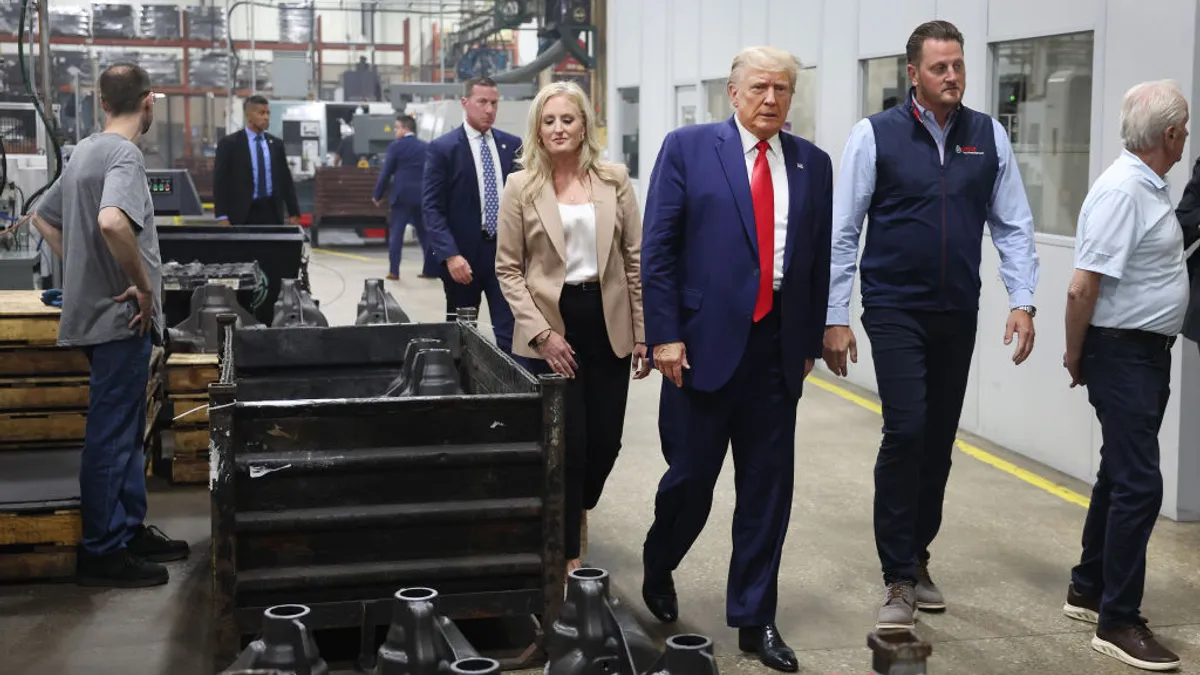Dive Brief:
- The United Auto Workers will not extend negotiations with General Motors, Ford or Stellantis after its labor agreements with the Big Three automakers expire at 11:59 p.m. on Thursday, UAW President Shawn Fain said during a Facebook Live event Wednesday.
- If the union cannot make a deal with the automakers before the contracts expire, UAW members could strike against GM, Ford and Stellantis simultaneously. However, the union plans to target specific facilities rather than strike all of them at once.
- The UAW will likely strike because the two sides are “very far apart on our key priorities,” Fain said.
Dive Insight:
If the UAW strikes against the Big Three, UAW members employed by GM, Ford and/or Stellantis would continue working under an expired agreement for the first time. Fain said the UAW would provide its members with more specifics via its website. According to the National Labor Relations Board, the National Labor Relations Act ensures that nearly all the expired contract’s terms would continue if both sides are bargaining in good faith.
Fain called the UAW’s new approach to striking a “stand-up strike,” saying that the union would ask certain local chapters to strike as needed, depending on how its negotiations with the Big Three are proceeding. He said the UAW would direct more workers to strike if negotiations were going poorly to give the union’s negotiators more bargaining power and vice versa.
“This is going to create confusion for the companies,” Fain said. “It's going to keep them guessing on what might happen next, and it's going to turbocharge the power of our negotiators.”
The UAW will announce which local chapters could strike first on Thursday at 10 p.m. ET.
Fain also provided an update about the union’s negotiations with the Big Three, noting that the parties have made some progress.
Fox 2 Detroit reported that Ford CEO Jim Farley was “optimistic” the two sides would make a deal by the deadline.
"We put an offer in today that's our most generous offer in 80 years of the UAW and Ford," Farley said at a Ford F-150 event Tuesday. "Pay increases, elimination of tiers, inflation protection, five weeks of vacation, 17 paid holidays, bigger contributions for retirement.”
But Fain accused Farley of making false statements about the automaker’s offer to the UAW.
“I find it funny and sad that Jim Farley, the CEO of Ford, told the press last night at the auto show that Ford had offered the elimination of tiers. That's not true,” Fain said. “Tiers remain at Ford under their proposal.”
The union is demanding cost-of-living adjustments, more paid time off and the ability to strike against plant closures. It has also proposed ending tiered wages and benefits, including 90 days for members to reach the maximum wage rate, as well as restoring pensions and retiree healthcare.
Since last week, the three automakers each proposed higher wage increases that are still far below the 36% raise the UAW is seeking:
- Ford increased its offer from 9% to 20% over four and a half years.
- GM increased its offer from 10% to 18% over four and a half years.
- Stellantis increased its offer from 14.5% to 17.5% over four and a half years.
Stellantis also reversed course on profit sharing after initially refusing the UAW’s proposal. The UAW said the automaker’s proposed arrangement would reduce profit sharing “based on an unknown internal company attendance calculation” but did not explain the proposal’s details further.
Ford also agreed to convert all temporary workers to full-time, in-progression employees after 90 days of continuous service, while GM and Stellantis did not make similar offers.
While all three automakers have rejected the UAW’s job security demands so far, Stellantis’ most recent proposal would allow the company to close and sell facilities, Fain said.
Ford also joined GM and Stellantis in agreeing to make Juneteenth a paid holiday, the UAW said.
Ford did not respond to a request for comment about ending tiered wages.












